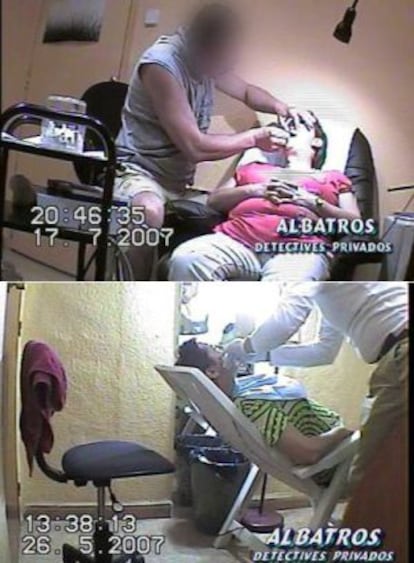Beware Madrid’s bogus dentists
Over 30 lawsuits against unqualified personnel are making their way through city’s courts

After getting eight implants and forking out €4,000 in dentist bills over the course of more than a year, 73-year-old retiree Olimpia Sáiz’s mouth was a bloody mess.
While her grandchildren only drew amusement from her experience, her friends told her she had to do something about it.
“Each tooth was a different color,” she says. “I went to three other clinics afterwards, and they were scared about what they saw. They said my mouth could no longer be fixed, and I decided to report it to the municipal police.”
The alleged dentist who did the botched job had been recommended to her by a gardener in the Madrid district of Hortaleza, who said he was cheap.
On November 4, Walter Gómez, a Colombian national, was sentenced to six months in prison for fraud and for operating without a valid dentist’s license.
But Gómez had reached a deal with prosecutors and never set foot in jail. The very next day, November 5, he reopened his practice in Hortaleza. The police have since acted against him again, and he will probably face a new trial.
In the meantime, Olimpia Sáiz managed to get her money back, and paid a similar amount to a real professional who finally fixed her mouth.
“But no amount of compensation can make up for the discomfort and pain of those months,” she says.
Many people are being conned, and when they finally realize that they are not in the hands of qualified professionals, things start to make sense”
Ramón Soto-Yarritu, head of the Madrid Dentistry Association
Sáiz’s is not an isolated case. In the city of Madrid alone, the official dentistry association has reported 15 cases of unlicensed activities, opened 33 investigations into misleading advertising, and received 191 patient complaints.
Inspectors have uncovered cases of foreign nationals working without a valid license in Spain, and of dental technicians performing surgery without the required qualifications.
J. A. G., a Spaniard aged around 50, was running a dental practice in Moratalaz until the National Police showed up at his door in January 2014. They were called in by a patient who wanted her money back after paying €3,000 for defective dental bridges and not even getting receipts for her payments.
When the patrol car pulled up, J. A. G. simply fled the scene. He was located after the police issued a search warrant for him, and now faces trial. Asked at the preliminary hearing about his qualifications, he admitted to having no more than elementary school studies. J. A. G. denied having performed any dental surgery at his practice, but several witnesses have stepped up to confirm that he did.
More than 30 lawsuits are now making their way through Madrid’s courts as a result of a campaign launched three years ago by the official dentists’ association against “low-cost dentistry” that often sees patients fall into the hands of unqualified practitioners. Private detectives have been sent into suspect centers by the association to snoop around, while other times it is patients who take action.
Ramón Soto-Yarritu, president of the Madrid Dentistry Association, says it will keep fighting the illegal centers, but that its battle would be a lot more effective if people were more aware.
“Many people are being conned, and when they finally realize that they are not in the hands of qualified professionals, things start making sense,” he says. “When they have health problems as a result, that is when they decide to file a complaint.”
In February of this year, the association, acting as the private prosecution, asked for four-year prison terms for three people who were running a clinic in Plaza de Castilla, in the north of the capital, and allegedly using an unlicensed tooth-whitening product that is potentially dangerous to human health.
English version by Susana Urra.
Tu suscripción se está usando en otro dispositivo
¿Quieres añadir otro usuario a tu suscripción?
Si continúas leyendo en este dispositivo, no se podrá leer en el otro.
FlechaTu suscripción se está usando en otro dispositivo y solo puedes acceder a EL PAÍS desde un dispositivo a la vez.
Si quieres compartir tu cuenta, cambia tu suscripción a la modalidad Premium, así podrás añadir otro usuario. Cada uno accederá con su propia cuenta de email, lo que os permitirá personalizar vuestra experiencia en EL PAÍS.
¿Tienes una suscripción de empresa? Accede aquí para contratar más cuentas.
En el caso de no saber quién está usando tu cuenta, te recomendamos cambiar tu contraseña aquí.
Si decides continuar compartiendo tu cuenta, este mensaje se mostrará en tu dispositivo y en el de la otra persona que está usando tu cuenta de forma indefinida, afectando a tu experiencia de lectura. Puedes consultar aquí los términos y condiciones de la suscripción digital.








































